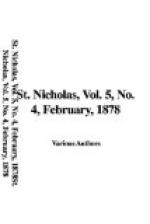“I can promise that, and I am sure Thorny will like you, for I told him your story, and he is anxious to see ‘the circus boy,’ as he called you. Squire Allen says I may trust you, and I am glad to do so, for it saves me much trouble to find what I want all ready for me. You shall be well fed and clothed, kindly treated and honestly paid, if you like to stay with me.”
“I know I shall like it—till father comes, anyway. Squire wrote to Smithers right off, but hasn’t got any answer yet. I know they are on the go now, so may be we wont hear for ever so long,” answered Ben, feeling less impatient to be off than before this fine proposal was made to him.
“I dare say; meantime we will see how we get on together, and perhaps your father will be willing to leave you for the summer if he is away. Now show me the baker’s, the candy-shop, and the post-office,” said Miss Celia, as they rattled down the main street of the village.
Ben made himself useful, and when all the other errands were done, received his reward in the shape of a new pair of shoes and a straw hat with a streaming blue ribbon, on the ends of which shone silvery anchors. He was also allowed to drive home, while his new mistress read her letters. One particularly long one, with a queer stamp on the envelope, she read twice, never speaking a word till they got back. Then Ben was sent off with Lita and the Squire’s letters, promising to get his chores done in time for tea.
(To be continued.)
CRUMBS FROM OLDER READING.
BY JULIA E. SARGENT.
EMERSON.
“Who ever heard of Emerson?” I asked a room of third-reader pupils. Nearly every hand came up, and the bright faces were full of interest. What a delightful surprise! I did not expect to see more than two hands, and here all were as interested as if I had said, “Who ever heard of Hayes or Tilden?” All at once I remembered that, for more than a week, every fence about the school had been covered with circus-bills, bearing the name “Billy Emerson.”
Sure enough he was the only Emerson those pupils knew about; for when I said Ralph Waldo Emerson, one by one the hands came down. No one had heard of him. Now I know no more of “Billy Emerson” than the children knew of Ralph Waldo Emerson, but I am not afraid to say that the one I know is better worth knowing.
For in papa’s library, or on mamma’s center-table, I have no doubt you can find more than one book which he has written. When in his sermon the minister tells what Emerson has said, you may be very sure he does not quote “Billy.” Papers and magazines all have something to say concerning this man, whose books grown people read and talk about.
Who is he, then? His name is Ralph Waldo Emerson, and he writes books.




